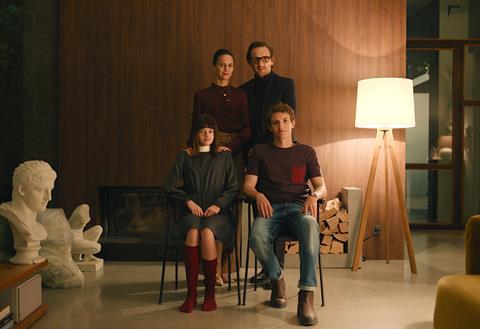A glass house in a Slovenian forest plays host to Sonia Prosenc’s satire of the nouveau riche

Dir/scr: Sonja Prosenc. Slovenia/Italy/Norway/Croatia/Serbia. 2024. 122mins
Slovenian father Aleksander Krajl (Marko Mandic), his wife Olivia (Katarina Stegnar) and their teenage daughter Agata (Mila Bezjak) are on a travelator at the airport heading to meet his older, estranged son Julien (Aliocha Schneider), when Aleksander realises Julien is walking in the opposite direction. Aleksander is forced to pace against the walkway for the greeting, offered in Julien’s mother tongue of French. It is a deadpan, out-of-kilter moment that will come to be emblematic of a family in which a common language is hard to find, and which is increasingly out of step.
A bone-dry comedic takedown of this over-privileged clan in the Yorgos Lanthimos vein
Writer/director Sonja Prosenc presents a bone-dry comedic takedown of this over-privileged clan in the Yorgos Lanthimos vein, with the sweet rebellion-driven connection that develops between Julien and Agata taking the edge off her more scathing moments of satire. The third film from Prosenc, whose previous works The Tree and History Of Love were both Slovenian Oscar selections, is likely to get plenty of further festival play after Tribeca and Sarajevo, thanks to its intelligence and humour.
Prosenc’s skewering of the nouveau riche, along with an absurdist Peter Strickland-style sideswipe at performance art, unfolds in an episodic style, via chapters. While this approach means it loses the tautness of the opening act, her exploration of the family’s vulnerabilities and willingness to offer them redemption (of sorts) is likely to attract a wider audience than more unforgiving satires.
“I became a man of nature,” Aleksander tells Julien once they reach the family’s luxurious modern home in the middle of a forest. It’s a deeply ironic statement given that he is also cautiously snipping a chunk from a plant in a tank on his desk. Nature, like so much else in Aleksander’s life, is kept very carefully under control. The whole house is like a human vivarium, with its huge picture windows giving a view of the forests from a nice safe distance. The caged feeling is further enhanced by the boxy academy ratio framing. In a running gag that, like much of the humour, carries a threatening undercurrent, any time anyone ventures into the woods the peace is shattered by the sound of hunting gunfire.
The splendid isolation features showhome production design from Tatjana Canic Stankovic, with artwork that dances perfectly on the edge of preposterousness. All this may be welcome to Aleksander and Olivia, but Agata is passive-aggressive in the face of being home schooled. Although it might seem as though we can see right through this family, Prosenc invites us to have some sympathy as she gradually reveals that at least some of their actions stem from genuine fears about their own fragility.
Nevertheless, people in glass houses shouldn’t be surprised if cracks start to appear. Julien is just the first of these and he soon introduces a second, when a family whose car has broken down arrives on the doorstep seeking shelter for the night. Aleksander’s instinct is to turn the light off, even though the strangers have already seen them, and Olivia’s response is hardly any less cool, whispering in a worried tone that they might be “refugees”. Through this and additional incidents, including a lavish party that doesn’t go to plan, the Krajls’s neat life begins to slowly unravel.
Prosenc’s regular cinematographer Mitja Licen uses static camerawork to heighten the sense of absurdity, with a switch to handheld camera bringing with it intimacy and danger. He also puts the reflective surfaces of the house to good use, so that nature seems as though it is encroaching even when it is on the other side of the glass. The scoring from synthpop duo Silence (Primoz Hladnik and Boris Benko), is based on Henry Purcell’s 17th century opera ‘King Arthur’. Its moving Baroque strings and brassy grandiosity are a perfect reflection of Aleksander’s initial attitude, fittingly and increasingly undercut by more modern moments of electro dissonance.
Prosenc’s desire to be generous to all of her characters as each spins off for their own little arc means the second half of the film loses some of its comedic acidity and starts to sprawl, with Olivia’s actions in particular less explicable than the others. It’s testimony to Prosenc’s writing abilities, however, that she finds an ending that is neat but not too tidy. Nature, including that of humans, is unpredictable, she suggests – and while it might sometimes be beastly, there’s beauty in there too.
Production companies: Monoo
International sales: Monoo rok@monoo.si
Producers: Rok Secen, Sonja Prosenc
Cinematography: Mitja Licen
Production design: Tatjana Canic Stankovic
Editing: Ivana Fumic
Music: Silence (Primoz Hladnik, Boris Benko)
Main cast: Marko Mandic, Aliocha Schneider, Mila Bezjak, Katarina Stegnar, Judita Frankovic Brdar, Jure Henigman






















